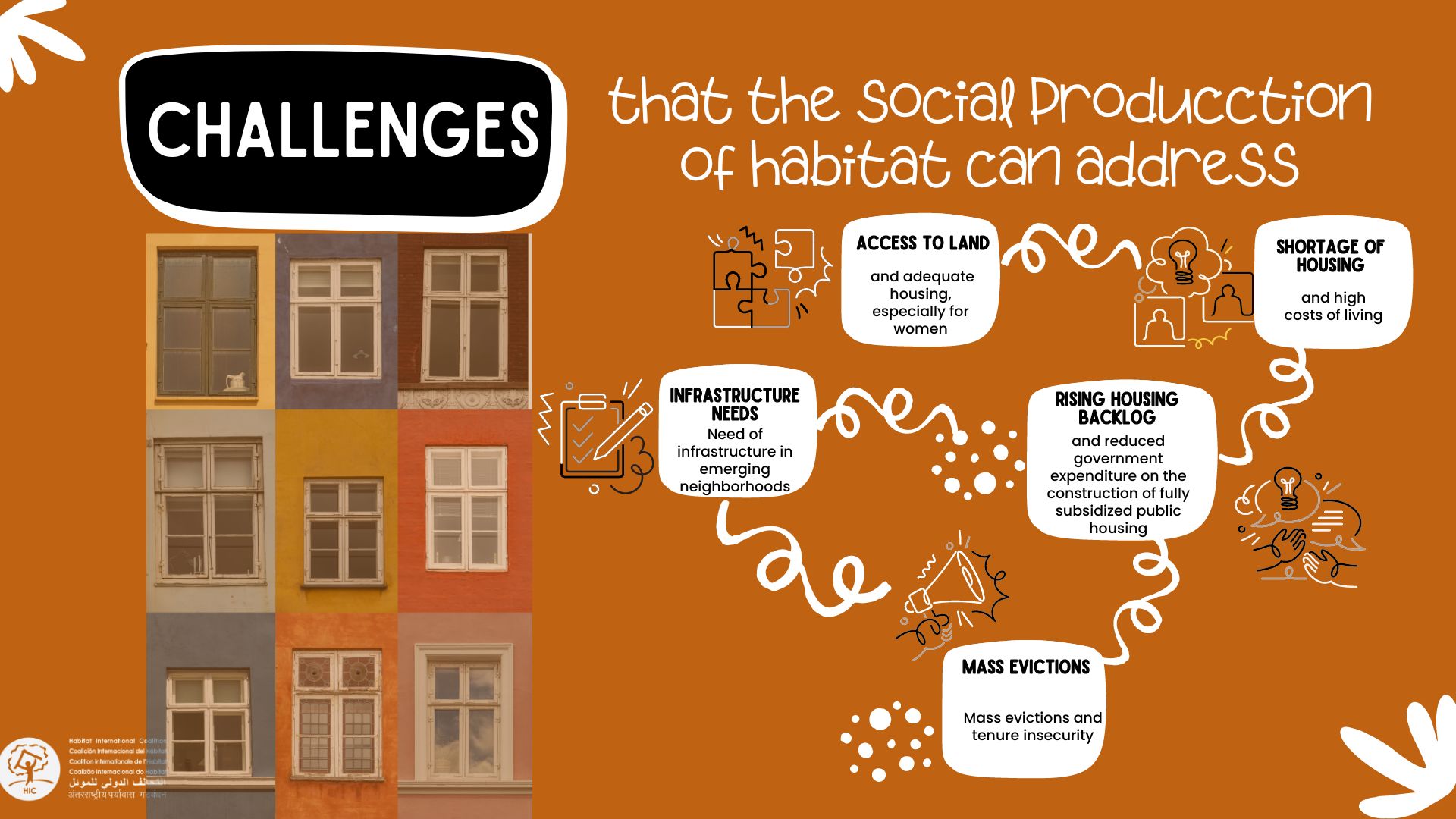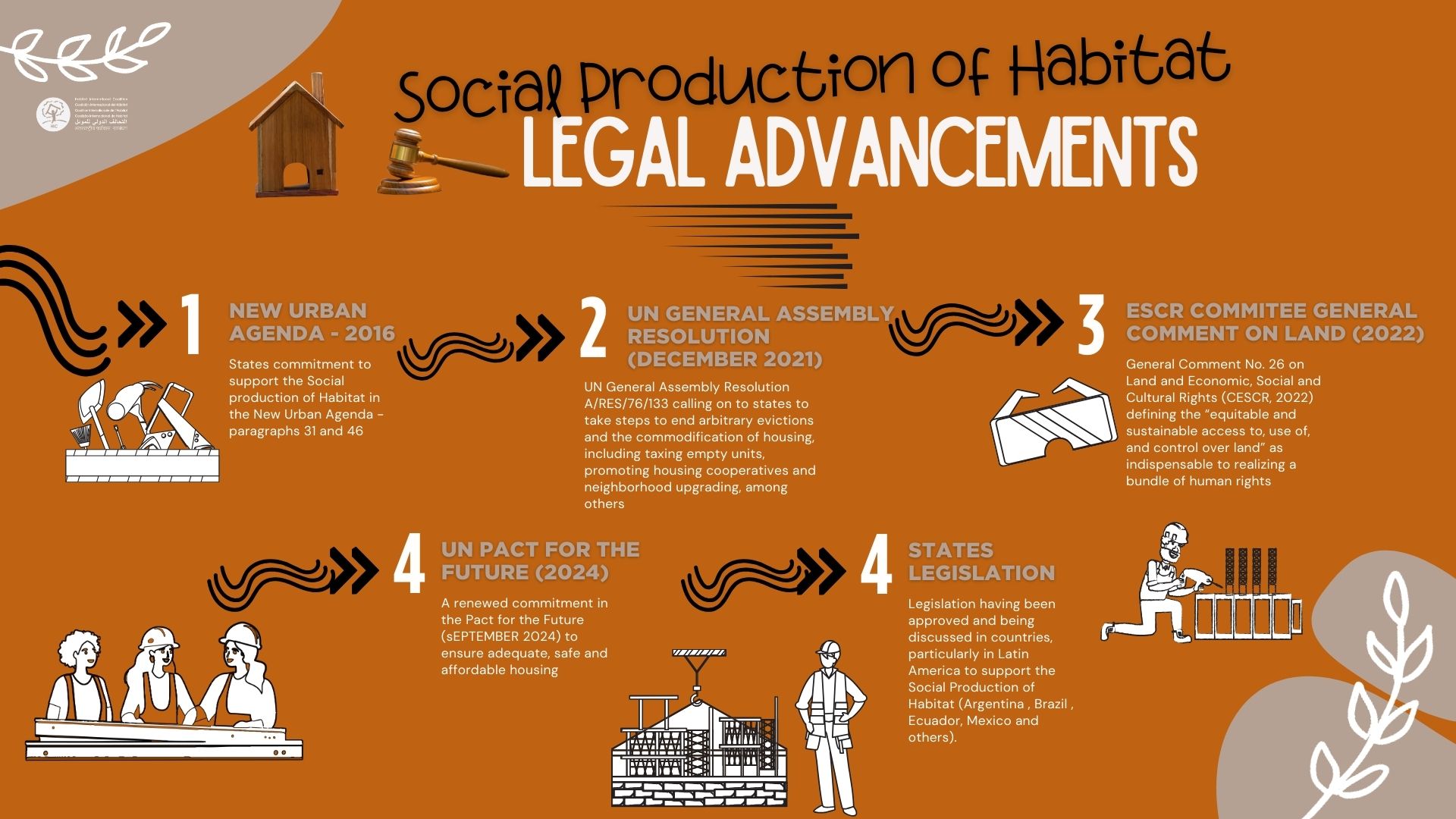Engaging youth for the right to housing and land through the Social Production of Habitat
This World Habitat Day invites us to reflect on the role of youth to “create a better urban future”. As we face an ongoing global housing crisis, it is clear that both today’s youth and the generations to come have a strong tendency to have a harder time finding affordable, adequate housing options than previous generations. Addressing this challenge requires not only a firm public commitment to housing, but making sure that public action is centered on models that guarantee the Right to Housing of all.
We join communities and their leadership in defending and fulfilling their human right to housing and land through the initiatives, practices and strategies understood broadly under the umbrella of Social Production of Habitat.
HIC Presidency Declaration for World Habitat Day
“The social production of housing and the residential, recreational, productive and service spaces that surround it reflects the identity of the inhabitants and, in the most-organised cases, leads them to remain committed to the convivial, supportive and open community management of their places. ”

Fulfilling the Right to Housing through the Social Production of Habitat

What is the Social Production of Habitat?

Enabling actions for supporting the Social Production of Habitat

In a time of rising conservatism and disaggregation, the fulfillment of basic rights such as housing should be grounded in processes that guarantee access and democratic control over land and strengthen democratic principles through people’s agency. There’s no Right to Adequate Housing without the Right to Land, and the increasingly difficulties in accessing well-located land fuel criminalization of movements trying to defend their right to housing.
From HIC we are convinced about the transformation power of the community-led processes as for instance the Social Production of Habitat processes, to produce housing solutions that are affordable, sustainable and democratically managed. With proper legal, regulatory, financial and political laws and tools, these experiences can represent a viable model for addressing the global housing crisis with responses that are community led, adapted to local contexts and realities and that uphold democratic principles in the face of speculation and commodification. Moreover, these responses can have significant impact both in advancing climate justice, as in incorporating an intersectional approach that sets out to reverse the patterns of worse conditions in the access to housing along gender and racial lines.

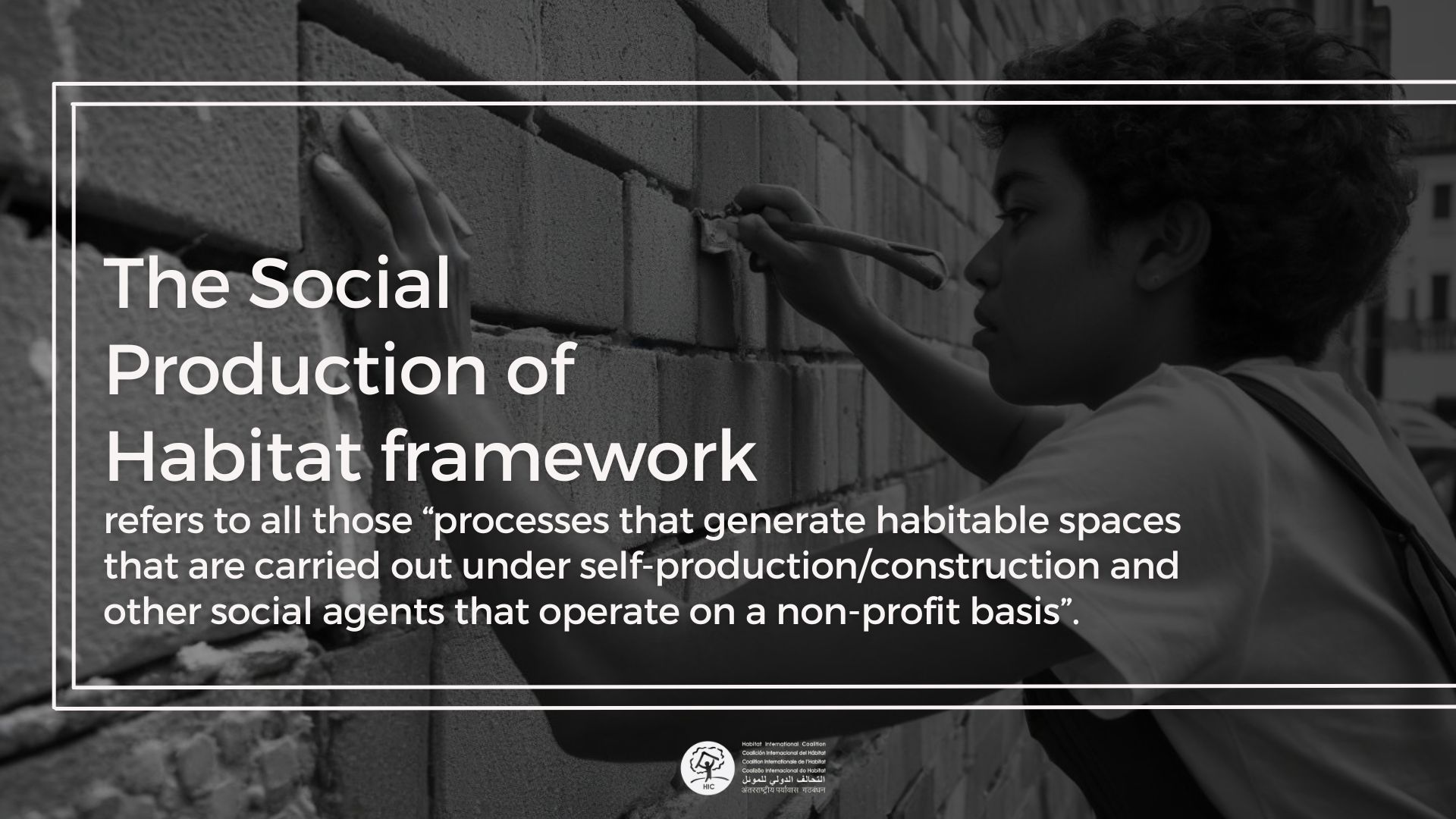
For decades, HIC and its members have adopted the Social Production of Habitat to refer to all those “processes that generate habitable spaces that are carried out under self-production/construction and other social agents that operate on a non-profit basis”.
Social Production of Housing and Habitat enables multiple options ranging from the improvement, extension and consolidation of housing; the construction of new housing, in progress or completed; collective and cooperative housing; the improvement of neighborhoods and rural settlements; and the production and management of large urban complexes and rural communities. The social production of housing and of the residential, recreational, productive and service spaces that surround it, reflects the identity and attachment of, and, in the most organized cases, leads the inhabitants to remain committed to the convivial, mutually supportive and open community management of their places. It also involves clear benefits in terms of sustainability (for example through the use of local materials), access to land and the activation of the local economy and the development of economic activities within the framework of housing.

The social production of habitat processes allows for a way of looking at popular housing from a perspective that does not stigmatize these spaces and focuses instead on the capacity of organization of communities to find solutions to realize their human right to adequate housing. This does not mean that such an approach excuses public institutions from their obligations to respect, protect and fulfill the human right to housing, but instead underscores that policies and regulations should be formulated by leveraging the agency and leadership of inhabitants.

For many years, HIC has been working to achieve public policies that expand the scale and social impact of Social Production of Habitat initiatives, particularly those related to collective ownership and management of housing and land. Some key aspects to be taken into account:
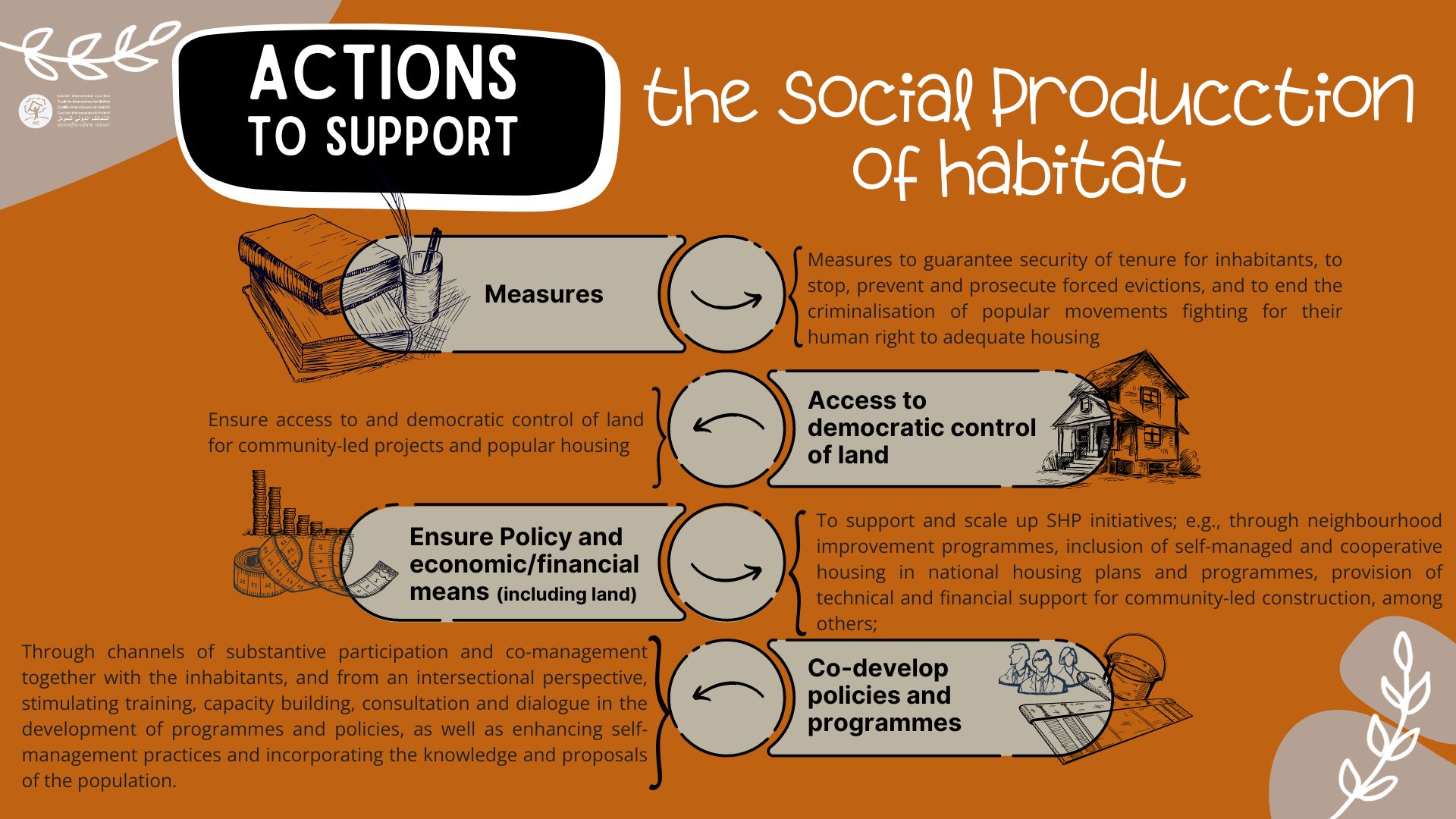
A) Measures to guarantee the security of tenure of inhabitants
B) Securing access and democratic control of land
C) Secure regulatory and economic / financial means (including land)
(D) Co-developing policies and programmes through channels for substantive participation and co-management along with inhabitants

New podcast on the Social Production of Habitat
Regional campaign - Our neighborhoods, our rights, our cities
HIC AL Statement on the World Habitat Day
HIC-HLRN Violations Database Report
Latin America Working Group on Social Production of Habitat
Global convergence on Social and Feminist Movements
Leaning dialogues on African Urban Commons
HIC Working Group on Land Rights
HIC Global Advocacy
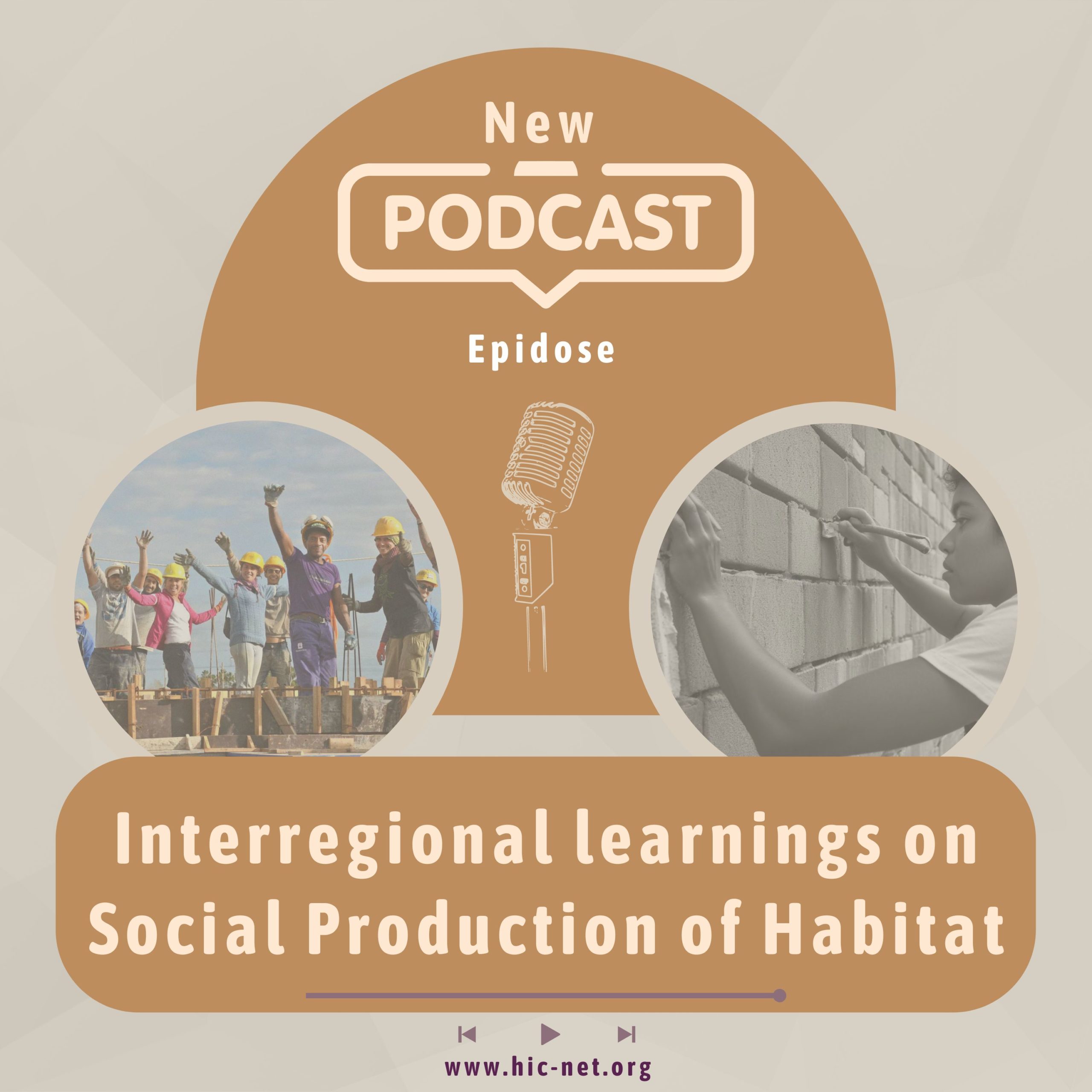
Listen to a valuable cross–regional learning on the new HIC podcast on the Social Production of Habitat
Over a year ago, through a facilitated mutual-learning process, HIC Members came together to exchange knowledge and experiences towards advocacy on the Social Production of Habitat processes.
Now all these experiences and learnings are available on a podcast episode available in English, French and Spanish.
Plans and initiatives for Urban October
1st HIC Online Dialogue on the Convergence of Social and Feminist Movements
The first online dialogue on the convergence of social and feminist movements will be held on Thursday, the 24th of October, 1700-1830 SAST (check your local time here).
The dialogue is part of the HIC convergence of social and feminist movements which is a cross-regional process towards the collective construction of a common agenda for action, informed by the struggles, local experiences, and political advocacy of the movements that operate within and outside of HIC, as well as to discuss the principles, processes, and practices that allow them to incorporate a feminist perspective.
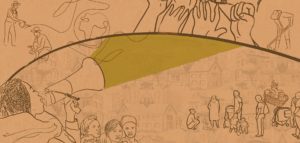 In this first dialogue, we are keen to deepen and advance on outcomes from the initial collective thinking that took place in 2023 where over 20 movements and HIC member organizations convened in Argentina, reflect on land, housing, and feminist approaches as points of convergence and identify priorities and opportunities of advancing the process, with a focus on the defense and promotion of the right to land and housing.
In this first dialogue, we are keen to deepen and advance on outcomes from the initial collective thinking that took place in 2023 where over 20 movements and HIC member organizations convened in Argentina, reflect on land, housing, and feminist approaches as points of convergence and identify priorities and opportunities of advancing the process, with a focus on the defense and promotion of the right to land and housing.
If you would like to attend this session, kindly register on this zoom link to allow us to prepare well in advance.
Ciudad Alternativa, Dominican Republic
In the framework of World Habitat Day, Ciudad Alternativa will be launching the campaign ‘Cries of the City’.
When? Monday, October 7th.
More info: http://www.ciudadalternativa.org.do/
Civic Forum on Housing and Habitat, Zambia
- Media Sensitisation on inclusive planning.
- Public discussion on slum upgrading and promotion of effective waste management
Why? These activities are developed with the aim of the creation of safe and secure urban spaces.
When? The entire month of October but the main activity will take place on the World Cities Day
More info: https://civicforum.org.zm/
CoHabitat Network, Geneve, Switzerland
Celebrating a decade of innovation in community-led housing
The CoHabitat Network will celebrate its 10th anniversary with a significant gathering of global housing advocates in Geneva from September 30 to October 4, 2024. Marking a decade of pioneering work in community-led housing, the event will feature a series of workshops, networking sessions, visits to housing cooperatives and a major public conference on October 1st.
More info: www.urbamonde.org

CODAS Caritas Douala, Cameroon
- Zero eviction campaign;
- Cities and Roofs of Cameroon exhibition
Goal: Raise awareness of the rights of residents in neighbourhoods threatened by forced evictions, and encourage NGOs to report violations of these rights; 2. Promote voluntary work as a means of increasing young people’s commitment to fulfilling their social responsibilities in various areas of development.
When? From 1 to 31 October 2024 (Milestones: Awareness campaign on 03 and 04 October 2024; NGO press briefings on 04 and 08 October; CODAS Caritas Douala press briefing on 07 October; Villes et Toits du Cameroun trade fair on 23 October.
Habitat Norway
Advocacy initiatives to raise awareness about role of youth in city planning after crisis.
When? 8 October, Arkitektenes hus, Oslo, Norway
More info: https://fb.me/e/2hpZoBHWo

FUNDASAL, El Salvador
A nationally touring photography exhibition on the precariousness of the habitat in which rural and urban communities live, as well as a case of an island.
The goal is to raise awareness through photography in public spaces about the precarious conditions that communities live in and the need for the approval of a housing law that responds to these needs.
More info: www.fundasal.org.sv/noticias/
Oppression through the denial of Habitat, a work by the Students from Escola Técnica Superior de Arquitectura of the Universidade da Coruña, Spain.
This is the title of the assignment given to students in the 2023-2024 academic year under the subject Basic Habitability at the Escola Técnica Superior de Arquitectura of the Universidade da Coruña, Spain.
It addresses the use of housing and habitat as warfare strategy for control and oppression. To do so, we will identify recent historical contexts, analysing the different ways in which housing planning and construction did not align with the commitment to a universal right, but rather with political agendas, from social control to the oppression and expulsion of part of the population.
Given its temporal and spatial proximity, we focus on the situation in the Gaza Strip. For this, we will study the historical and political context of the conflict that precedes the current invasion, the use of settlement villages and deprivation/rationing of supplies
and unequal distribution of resources as tools of oppression, as well as the resulting habitat conditions, visible in the state of housing and basic infrastructure.
We will then analyse the process of destruction of that habitat, the goals — whether explicit or not — and the effects generated in the built environment, including the population displacements caused.
The academic outcomes produced are shown here. Aniversario do conflicto en Gaza: Exposición da materia Hábitat Básico (udc.es)
The course ended on May 15, 2024. We must warn that much of the material produced at that time may contain information and data that have since become outdated.
Prohabitat Foundation, Bolivia
Conversation: ‘Towards Sustainable and Just Cities’.
Monday 7 October GMT-4Time: 19hrs.
Virtual Format
Open Broadcast: https://www.facebook.com/fundacionprohabitat/
———————-
Webinar Series: ‘Youth and Urban Development: Building Cities of the Future’.
- Monday 14 October GMT-4
- Monday 21 October GMT-4
- Monday 28 October GMT-4
Virtual Format
Open Webcast: https://www.facebook.com/fundacionprohabitat/
Web 1: ‘The role of young people in the management of urban development’.
Web 2: ‘Innovation and technology: Tools for building sustainable cities’.
Web 3: ‘Youth Participation: Transforming Public Spaces’.
Streaming: https://www.facebook.com/fundacionprohabitat/
Proyecto Habitar, Argentina
Screening of the documentary ‘HABITAR’ followed by a round table discussion with organisations working for the right to habitat in the Province of Buenos Aires.
Monday 7 October GMT-3
📡 Hybrid Format
📍 Headquarters of Proyecto Habitar and Fundación Vivienda y Comunidad, Ciudadela.
✏ With previous registration: https://forms.gle/PHqfdmxfW94Q65Fb6
Streaming: https://www.youtube.com/@ProyectoHabitarPH
Rooftoops Canada
Affordable housing study visit in Toronto, Ottawa and Montreal.
To explore the Canadian affordable housing context and provide opportunities for African and Canadian housing and urban development professionals to learn from each other’s experiences.
More info: www.rooftops.ca
The Bartlett Development Planning Unit, DPU - UK
The Feminist-turn of Environmental Justice
More info: www.eventbrite.co.uk/e/the-feminist-turn-of-environmental-justice-tickets-1023509443297
A DPU70 Dialogues in Development event
What has a Feminist perspective brought to the pursuit of Environmental Justice as a critical enquiry, as a collective struggle and as a means to decolonise research and planning practice and theory? As a means to promote alternatives based on collective power, care and solidarity?
As an interpretative framing and vibrant social movement, Environmental Justice (EJ) has expanded its scope over the years to encompass not just struggles for redistribution but also for parity of participation, recognition and rights. This expansion has been heralded by a shift from an anthropocentric to an ecocentric perspective, and a deeper critique of the entangled questions of patriarchy, contemporary capitalism and colonialism in and across cities. Feminist perspectives have been central to the opening of further possibilities in EJ, provoking new ways of seeing, feeling, and doing.
Drawing on their own trajectories as researchers, planners and feminist activists, the speakers will explore their own engagement with and reading of the Feminist Turn of Environmental Justice.
Chair
Caren Levy, Professor of Transformative Urban Planning, The Bartlett Development Planning Unit (DPU)
Speakers
· Adriana Allen, Professor of Development Planning and Urban Sustainability (DPU) and former President of Habitat International Coalition (HIC) (2019-23)
· Bruna Ferreira Montuori, Research Fellow, Listen, Learn & Leap Project, (DPU).
· Jordana Ramalho, Associate Professor in Development Planning for Diversity (DPU) and Programme Leader of the DPU MSc in Urban Development Planning.
